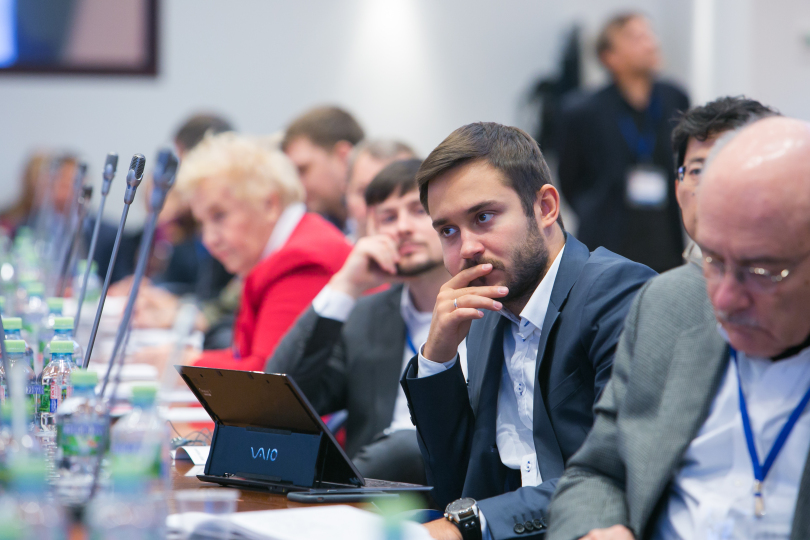-%D1%84%D0%B8%D0%B7%D0%B8%D0%BA%D0%B05.jpg)
Sociologists Outlined Institutional Landscape of Russian Physics
Social scientists from National Research University Higher School of Economics (NRU HSE) measured scientific capital of 39 physics institutions of Russian Academy of Sciences (RAS). More detailed information about research results can be found in the journal Scientometrics.
-%D1%81%D1%8B%D1%80%D1%8B.jpg)
How Food Affects Political Regimes
Better nutrition can have a lot to do with the transition to democracy: the more protein-rich, high-quality foods appear in a society's diet, the higher the likelihood of democratic reforms. Apparently, a richer diet is associated with an increase in the middle class, which tends towards economic and political independence and democracy-fostering values. Andrey Shcherbak has found, based on a cross-country comparative study using data on 157 countries, that a change in people's eating habits can serve as a predictor of impending political change. His findings are published in the paper 'A Recipe for the Democracy? The Spread of the European Diet and Political Change'.

Higher Education Conference Draws to a Close
From October 20-22, 2016, the Russian Association of Higher Education Researchers held its 7th International Conference ‘University between Global Challenges and Local Commitments’ at HSE Moscow. This annual event brings together researchers and educators who are interested in higher education development to discuss challenges and goals facing universities and their stakeholders (students, faculty, administrators, graduates etc.).
-%D0%B2%D1%83%D0%B7-%D1%81%D1%80%D0%B5%D0%B4%D0%B0%20%D0%B4%D0%BE%D0%B1%D1%80%D0%BE%D0%B6%D0%B5%D0%BB%D0%B0%D1%82%D0%B5%D0%BB%D1%8C%D0%BD%D0%B0%D1%8F.jpg)
Academic Environment Can Affect Student Honesty
Disciplining students for a variety of activities, such as downloading papers from the internet, engaging in plagiarism or cheating on exams may not work when academic dishonesty is so commonplace at university that even top performers tend to follow the crowd in this. Indeed, academic misconduct can be self-perpetuating: if a student gets away with cheating once, they are more likely to cheat next time, according to Natalia Maloshonok.
Higher Education Conference Set to Feature Wide Variety of Topics
On October 20-22, 2016, the Russian Association of Higher Education Researchers will hold its 7th International Conference in Moscow. This annual event brings together researchers and educators who are interested in higher education development in a forum to discuss challenges and goals facing universities and their stakeholders (students, faculty, administrators, graduates etc.).
MIT Professors Discuss Microbiopolitics Through the Lens of American Cheese
On Monday, October 3, two professors of anthropology from the Massachusetts Institute of Technology (MIT) – Heather Paxson and Stefan Helmreich – delivered a seminar for students of HSE St. Petersburg Master's programme in Applied and Interdisciplinary History. A presentation by Professor Paxson focused on how the microbiopolitics of cheese making in the U.S. presupposed and promoted industrial methods and standards and how in recent decades interest in producing and consuming artisanally made, raw-milk cheese has risen dramatically.
-%D0%B7%D0%B0%D0%B2%D0%BE%D0%B4-%D0%B0%D0%B2%D1%82%D0%BE%D1%81%D0%B1%D0%BE%D1%80%D0%BA%D0%B0.jpg)
Impact of Economic Crisis on Russian Subsidiaries of Western Multinationals
Despite the economic crisis, Western multinational corporations have been expanding their manufacturing facilities in Russia. Last year, foreign companies launched 63 new subsidiaries in Russia (twice as many as in 2013), and closed no more than ten. This year, they expect to put into operation a few dozen new subsidiaries, according to HSE researchers' study 'Russian Manufacturing Subsidiaries of Western Multinational Corporations: Preliminary Results and Future Prospects.'
Monthly Public Administration Discussion to Focus on a Stress Test for Public Finances
On October 10, the HSE School of Public Administration hosted its monthly discussion series. This month’s event is entitled ‘Stress Test for Public Finances – Policy-Responses to the Financial and Economic Crisis in the OECD’ and was led by Prof. Dr. Uwe Wagschal of the University of Freiburg (Germany). Professor Wagschal's talk focused on the consequences of massive monetary and fiscal stimulus for the public purse and will compare the fiscal packages in 28 OECD-countries aimed at combating an economic downturn following the collapse of Lehman Brothers in 2008.

Why Economic Forecasters Fail
The human factor, a reluctance to scare investors and the absence of tangible rewards for predicting recessions are some of the reasons why professional forecasters sometimes fail to signal economic downturns. In their study, Sergey Smirnov and Daria Avdeeva found evidence indicating that professional forecasters tend to hold on to optimistic scenarios for too long.
-%D0%BC%D0%B0%D0%BC%D0%B0%20%D1%81%20%D1%80%D0%B5%D0%B1%D0%B5%D0%BD%D0%BA%D0%BE%D0%BC%20%D0%B7%D0%B0%20%D1%81%D1%82%D0%BE%D0%BB%D0%BE%D0%BC.jpg)
How Children Affect Mother's Career
Mothers of three or more children are four times as likely to be unemployed compared to mothers of one or two children, according to Alina Pishnyak's study 'Employment opportunities and constraints for women in Moscow.'

